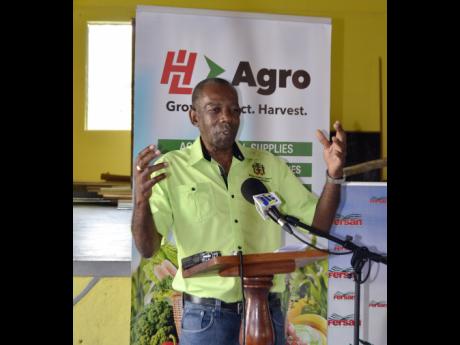Tougher penalties proposed for farm theft
If William J.C. Hutchinson has his way, persons convicted of farm theft will be made pay dearly for their crime.
Hutchinson, the minister without portfolio in the Ministry of Industry, Commerce, Agriculture and Fisheries, last Friday offered some insight into a plan being reviewed as a practical measure to discourage praedial larceny.
If implemented, the plan would see the thieves repaying farmers full value of their stolen property, in addition to serving prison time.
"The praedial thief, once caught and convicted in a parish court will, in addition to his punishment, be ordered to make restitution in amounts to compensate for the loss the farmer sustained," Hutchinson told a stakeholders consultation conference hosted by the Jamaica Dairy Development Board.
"That means, we intend to look at, if you lose an animal, not only what the court is going to charge that thief but he must pay you back for the animal that he has stolen," said Hutchinson during a function at the Medallion Hall Hotel in St Andrew.
He argued that more drastic action was deemed necessary in light of the devastating impact of thieves who prey on agriculture, with the annual total loss suffered by Jamaican farmers now conservatively estimated to be in excess of $6 billion each year.
This is despite a number of initiatives over the years, including the introduction of a receipt book system which makes it mandatory for farmers to supply their customers with receipts detailing the volume and value of crops or livestock sold.
MAJOR DISINCENTIVE
A 2010, survey titled 'Analysis of the State of Praedial Larceny in member states of CARICOM' carried out among regional stakeholders identified praedial larceny as the single most discouraging aspect of agriculture, a major disincentive to investment in the sector and a threat to livelihoods in farming and fishing across the region.
Conservative estimates then calculated the loss from theft of crops, livestock, and fresh and marine fish in the region of US$321 million annually or an estimated 17.9 per cent of regional agriculture output.
Maxine Brown, livestock specialist with the Rural Agricultural Development Authority, the agency tasked with providing extension services to farmers, told The Sunday Gleaner that efforts to re-energise the agriculture sector were being undermined by this growing criminal scourge.
"Thieves are not even stealing with a conscience because they are coming and taking everything that you have, if it's possible. So that kind of thing makes it difficult to attract investors," said Brown.
Meanwhile, the regional analysis also highlighted two other potentially devastating fallouts from the runaway theft of livestock and food crops, which are often overlooked.
"This (praedial larceny) does not take into account the future loss to agriculture productivity as high-quality genetic breeds of livestock and crop varieties are stolen from breeding stations and agriculture research facilities to be sold as food.
"Also not taken into consideration in this analysis are the potential public-health consequences and subsequent industry consequences when uncertified crops or livestock meats are integrated into the domestic food chain," the analysis showed.
Now Hutchinson is determined that more drastic action is needed to send a serious message to persons who continue to undermine the national effort to achieve food security and nutrition.
"It's very controversial out there but it is one that I strongly believe in, and we are moving to see how we can get this going," he warned.
In the first seven months of this year, the police Praedial Larceny Prevention Unit reported that 83 persons were arrested for farm theft, compared to 23 for the corresponding period in the year 2016.
Thirty-three stolen animals were recovered, compared to 31 for the corresponding period in 2016.
Additionally, 67 farm security assessments were conducted, compared to 21 for the corresponding period.
Farm security assessments are done with a view to identify trends and analysis that can help to safeguard investments and offer workable solutions to farmers to protect life and property.

